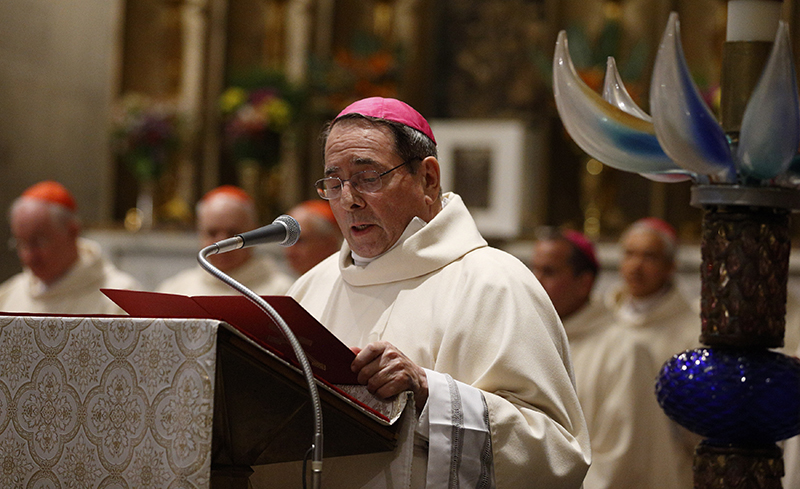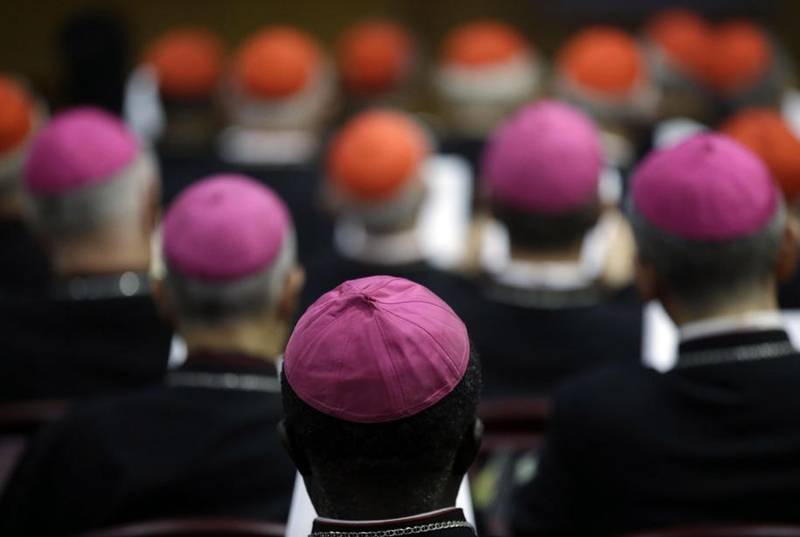By Emmanuele Barbieri

Around a hundred people gathered at the Pilgrim Centre “Santa Teresa Couderc” in Rome, for the international conference entitled Ways of Love: Snapshots of Catholic Encounters With LGBT People and Their Families, sponsored by the “Global Network of Rainbow Catholics”, a worldwide network of organisations that, in the name of “social justice”, demands inclusion and dignity for LGBT people and their families within the Catholic Church and society in general.
The meeting was attended by Catholic pastoral leaders from around the world, who came together to share, through their stories, their pastoral approach and work in favour of LGBT people within their ecclesiastical communities. In addition to drawing up new action plans, a clear and stated objective of the initiative was to apply some pressure to the impending crucial Ordinary Synod of Bishops on the topic of the Family, which opened in Rome on Monday 5th October.
Presenting the event, two of the conference spokespersons, Andrea Rubera and Martin Pendergast, advocated peaceful dialogue with the community and Catholic institutions, stating:
“Taking inspiration from the second Encyclical of Pope Francis, (Laudato Si), we feel that the time has come for us all to build and care for our shared home, the Church, with commitment from every member of the Roman Catholic community. Our shared home does not need struggle or division. We must find a place for each and every one of God’s people, including LGBT people. The experiences that we bring to the conference in Rome on ‘The Ways of Love’ show us that pastoral work, for and with LGBT people, is already a reality in many parts of the world, without creating any problems for the communities in which it takes place. The idea that we wish to put to the bishops gathered in Rome for the Synod is that we can – and we must – find new ways to spread these models of pastoral work and develop new ones.”
The first speech of the day, as part of the “Snapshots of Pastoral LGBT Projects”, was that of Chilean Jesuit priest Pedro Labrin, the national ecclesiastical assistant of the “Christian Life Community” (CLC/CVX) in Chile. Speaking of his initiative “Sexual Diversity Pastoral Padis+”, which promotes the full inclusion of LGBT people within the Catholic Church, Labrin recalled the story of Daniel Zamudio, presenting him as a martyr of homophobia: “The blood of martyrs is still fresh and it is they who help us to understand what the Second Vatican Council meant by the term Church, the People of God. (…) Daniel did not die by God’s will but by the will of homophobes”.
Next, the American nun Jeannine Gramick took the floor: she was the founder in 1997 with Father Robert Nugent, of the “New Ways Ministry” in the Archdiocese of Washington – an organisation founded with the aim of promoting “justice and reconciliation between lesbian and gay Catholics and the wider Catholic community”. In 1999, as a result of her work and in clear contrast with Catholic doctrine Sister Gramick, together with Father Nugent, was the subject of a notification by the Congregation for the Doctrine of the Faith through which they were “permanently prohibited from any pastoral work involving homosexual persons” and ineligible, “for an indeterminate period, for any office in their respective religious institutions”.
Sister Gramick said she converted to a broader and more authentic interpretation of the Gospel after meeting a lesbian, and she spoke of her tireless work in favour of LGBT people. In particular, Gramick stressed the commitment of her parish in the referendum campaign in favour of same-sex marriage equality, a commitment that has made a decisive contribution to changing the opinion of many Catholics, convincing them to vote in favour of gay marriage. Sister Gramick said that she received the approval of the bishop himself for her work, who, despite being publicly known as a conservative, showed great compassion for the LGBT cause. Following the gay marriage victory, according to Sister Gramick the bishop conceded defeat, admitting: “You have won and we have lost; it is you who talk of love and acceptance and not us!” Then Sister Gramick, hoping that the experience of the “New Ways Ministry” may extend from the United States out into the world, offered those at the conference some guidelines and pastoral advice to put into practice in their own parishes and communities: the importance of direct communication with the bishops of the dioceses; the involvement of parishioners, putting them in touch with their bishops to demonstrate to them the faith of lesbians, bisexual, transgender and transsexual people who need to feel accepted, not only by parish priests, but also by the most senior hierarchies of the Church.
Next to speak was Martin Pendergast, a member of the Pastoral Council of Westminster for LGBT Catholics, who shared his own experiences by presenting the projectAll are welcome. After declaring that “homosexuals have the right to effective and welcoming pastoral care” and “the same rights as heterosexuals to receive the sacraments”, Pendergast, who lives happily with another man, stressed that the initiative All are welcome had received the support of Cardinal Vincent Nichols, Archbishop of the Catholic diocese of Westminster. Pendergast then recalled the vicissitudes of his LGBT community in recent years, highlighting with satisfaction how the current church of “Jesuit Farm Street” held a popular “gay Mass”, open to Catholics of all sexual orientation, creating a truly inclusive community where “pastoral needs and concerns are welcomed by the parish and the diocese”. He also hoped that the example of the pastoral work in “Farm Street” may, in the future, become a model to be exported to all other dioceses across the world, stating that there are already many ecclesiastical communities that are interested in the work they are doing. With this is mind, Pendergast gave some practical suggestions, recommending that the model should “not be imposed from above but grow from the roots of pastoral practice.” He then concluded his speech, expressing the hope that in the next Synod on the Family: “a real listening process can be opened up on a global, national and diocesan level, so that the pastoral needs of LGBT Catholics and their families are not given a “one size fits all” pastoral model, but a response that takes into account each and every individual aspect, also leading to grace”.
It was then the turn of Italians Pino Piva and Anna Vitagliano to take the floor, presenting their joint initiatives in the LGBT field. Jesuit Father Piva talked about his project Church, a home for everybody, launched on 3rd April 2014 and still in progress in the parish of San Saba in Rome “Where people, not stereotypes, meet”. The initiative, launched in the parish and ardently supported by Monsignor Matthew Zuppi, auxiliary bishop of Central Rome, is an “invitation to meet and share spiritual experiences with others, seen from the viewpoint of each individual: secular or religious, elderly or young, gay or straight, single or married, cohabiting or divorced”. According to Father Piva, the future of pastoral work must continue in this inclusive direction, so that people are heard before any words of blame or condemnation are spoken.
Anna Vitagliano then presented the initiatives organised as part of the Spirituality of Frontiersproject held at the Casa del Sacro Cuore in Galloro in the province of Rome. This is a two-fold educational initiative consisting of a “spiritual weekend retreat”, linked to the Roman initiativeChurch, a home for everybody and “Training workshops for pastoral ministers and spiritual leaders”.
The day’s proceedings were concluded by the most anticipated and important speaker of all due to the position he holds, the Dominican Bishop Raúl Vera López from the Mexican diocese of Saltillo, known for his views that are openly in contrast with Catholic doctrine, in favour of the rights claimed by LGBT and promotion of abortion. The bishop started by declaring that he felt honoured and privileged to be breaking new ground together with the LGBT community. He then praised the skill and organisational capacity of the gay rights movement, likening the LGBT community to the tiny ants in a Mexican proverb which, through their perseverance and hard work, manage to defeat monsters far greater than themselves: “those who are small and well organised overcome the monsters; you are well organised and you will win.”
Lastly, Bishop Vera López pointed the finger at those priests who, he said, use the Bible as a club to beat poor sinners, and urged them to open their eyes to today’s social changes. At this point, having declared his support for all kinds of family, gay and straight, he addressed the audience with a heartfelt and urgent appeal: “We need you to create a more inclusive church; you are our saviours. (…) The Church did the same work with migrants and subsequently society began to change. (…) Now, Pope Francis needs us. He has cast aside the doctrine and has taken up the Gospel of mercy, peace and love. Please help us!”
This international conference organised by the “Global Network of Rainbow Catholics” shows only too clearly the historic conflict taking place within the Catholic Church. The now famous and overused phrase of Pope Francis from July 2013, “if a person is gay and seeks God, who am I to judge” has proven to be an extraordinary boost for the LGBT community which, in spite of the doctrine, is today seeking a revolution within the Church in the name of the Gospel and God’s mercy. The numerous guest speakers demonstrated that this process is already underway and, in some cases, is also benefiting from significant support within the hierarchy of the Catholic Church.
Complete Article HERE!




